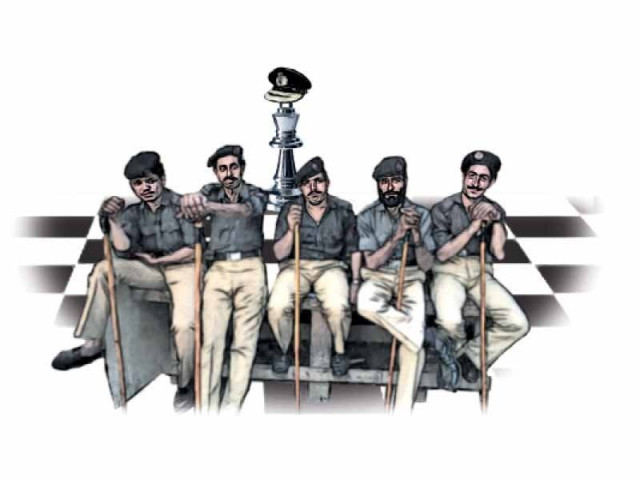Bulldozing amendments: K-P Assembly stands divided on new police bill
Leader of opposition refutes chief minister’s claim of consensus

PHOTO: EXPRESS
Insiders said that Chief Minister Pervaiz Khattak, who presided over the meeting, skipped a majority of amendments proposed by the opposition members.
“When clauses submitted by opposition members were brought up for discussion, the chief minister insisted “Aagay Jao” (Move forward),” a source privy to the development said.
“Most amendments submitted by the opposition (parties) were (thus) bulldozed,” said an insider who attended the meeting, adding that the chief minister simply ignored the objections of the opposition members.

After the meeting, the chief minister told media persons that the opposition and the government were in agreement over the bill.
However, Leader of the Opposition in the provincial assembly Maulana Lutfur Rahman refuted the chief minister’s claim, saying the opposition parties “still have objections over some points”.
Policemen do not want anyone to question their actions, he said.
According to him, maintaining law and order was the provincial government’s responsibility.
Meanwhile, many lawmakers criticised Maulana Rahman’s role, saying that he did not react when the government refused to accept the opposition’s proposals.
Parliamentary leader of Pakistan Muslim League-Nawaz (PML-N) Sardar Aurangzeb Nalota was not included in the committee and Awami National Party’s (ANP) parliamentary leader Sardar Hussain Babak did not attend the meeting.
Nolata later accused assembly speaker Asad Qaiser of deliberately not including his name among committee members.
Babak said that he had not attended the meeting in protest. “The government is (bent upon) giving all powers to the inspector-general. They (the government) bulldozed all our amendments … why should we attend the committee meeting?” Babak asked, vowing to oppose the bill in the assembly.
“They are trying to create a police state, making police beyond reproach,” said Nalota, adding that his party was thinking about challenging the proposed law in court prior to its adoption in the assembly.”
He said that they had held a meeting with the Adviser to the Prime Minister Amir Muqam in this regard and were planning to hold the next meeting before the bill’s adoption.
The opposition’s main demands pertaining to the IG’s administrative powers were bulldozed by the chief minister, contending that it would amount to inviting political interference in police.
“The IG does not represent our province. He is a federal government employee and he is already empowered to carry out transfers and postings, meaning we have given up our powers to the federal government … The chief minister did not understand our point of view,” said JUI-F’s lawmaker Malik Noor Saleem, who attended the meeting, said. He pointed out that dispute resolution councils still remained intact in the bill.
The opposition members favoured granting the committee 25 per cent seats for direct recruitment on posts of Deputy Superintendents Police (DSPs) through the provincial Public Service Commission, but the move was resisted by Inspector-General (IG) of Police Nasir Khan Durrani, allowing just five per cent such posts.
The committee agreed to grant the chief minister powers to order inquiries against police officials on charges of abuse of powers. The inquiry committee would comprise three members, two civilians and a police official. Likewise, the committee took back the power from the district assembly to pass resolutions against the head of police for premature transfer.
It agreed to provisions that the district police heads should have powers to regulate public assemblies and processions and issue orders for maintaining public order or preventing public nuisance in consultation with the deputy commissioners and district Nazims concerned.
Regarding the appointment of the IG, it was decided that since the National Public Safety Commission did not exist, the federal government should send the entire list of eligible police officials and the final decision would be made by the government.
The chief minister maintained that public safety commission were made more powerful to keep the police under check.
The bill will now be sent to the cabinet along with the recommendations of the select committee and afterwards it will be brought back to the assembly for legislation.
Published in The Express Tribune, January 19th, 2017.












COMMENTS
Comments are moderated and generally will be posted if they are on-topic and not abusive.
For more information, please see our Comments FAQ